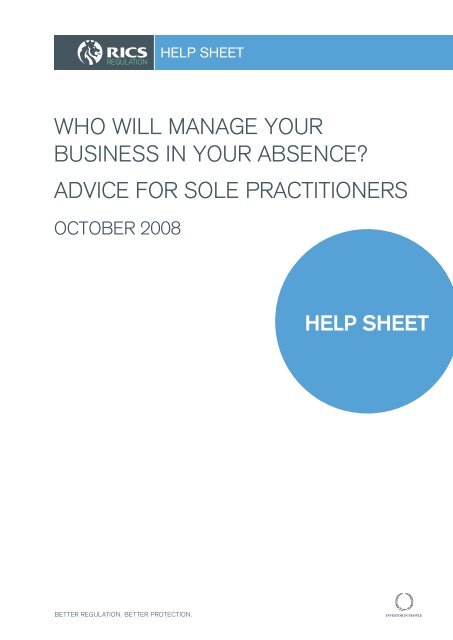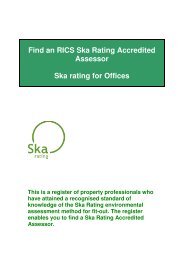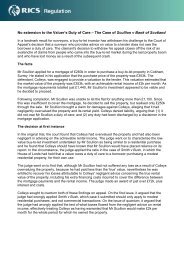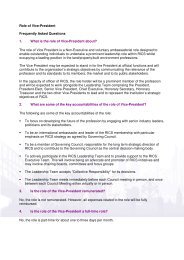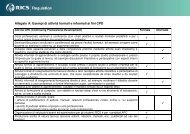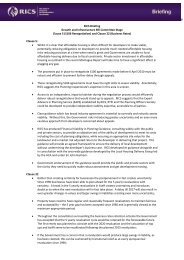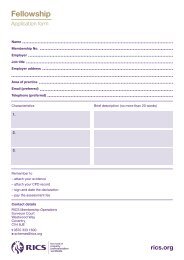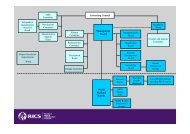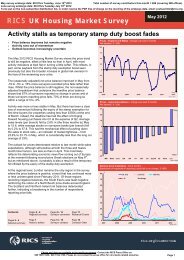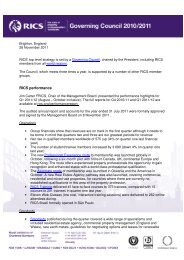who will manage your business in your absence? advice for ... - RICS
who will manage your business in your absence? advice for ... - RICS
who will manage your business in your absence? advice for ... - RICS
You also want an ePaper? Increase the reach of your titles
YUMPU automatically turns print PDFs into web optimized ePapers that Google loves.
BETTER REGULATION. BETTER PROTECTION.<br />
HELP SHEET<br />
WHO WILL MANAGE YOUR<br />
BUSINESS IN YOUR ABSENCE?<br />
ADVICE FOR SOLE PRACTITIONERS<br />
OCTOBER 2008<br />
HELP SHEETS<br />
HELP SHEET
Rule 12: Arrangements to cover the <strong>in</strong>capacity or death of a sole practitioner<br />
A firm which has a sole pr<strong>in</strong>cipal (ie a sole practitioner or a sole director <strong>in</strong> a corporate practice) shall<br />
have <strong>in</strong> place appropriate arrangements <strong>in</strong> the event of that sole pr<strong>in</strong>cipal’s death or <strong>in</strong>capacity or other<br />
extended <strong>absence</strong>.<br />
Aim<br />
To ensure that sole practitioners have arrangements <strong>in</strong> place to cover them <strong>for</strong>:<br />
• A long term <strong>absence</strong> because of illness<br />
• In the event of death<br />
• Long term holidays (eg longer than a month)<br />
• Un<strong>for</strong>eseen or unavoidable events.<br />
Mak<strong>in</strong>g arrangements to appo<strong>in</strong>t a locum<br />
A locum is a person <strong>who</strong> <strong>will</strong> stand <strong>in</strong> <strong>for</strong> you while you are away from the office. If <strong>your</strong> work <strong>in</strong>cludes<br />
<strong>in</strong>vestment <strong>bus<strong>in</strong>ess</strong>es as def<strong>in</strong>ed by the F<strong>in</strong>ancial Services and Markets Act 2000 you are legally<br />
required to have a locum.<br />
Another <strong>RICS</strong> member <strong>who</strong> works <strong>in</strong> <strong>your</strong> area, a solicitor or an accountant are suitable choices to<br />
appo<strong>in</strong>t as a locum.<br />
The locum agreement<br />
We would recommend that you have <strong>in</strong> place a <strong>for</strong>mal agreement with <strong>your</strong> locum.<br />
The agreement should <strong>in</strong>clude details of:<br />
• The nature of the appo<strong>in</strong>tment<br />
• Ma<strong>in</strong>ta<strong>in</strong><strong>in</strong>g <strong>your</strong> firm’s confidentiality<br />
• Any possible conflicts of <strong>in</strong>terest the appo<strong>in</strong>tment might create<br />
• The fee the locum <strong>will</strong> be paid<br />
• End<strong>in</strong>g the arrangement<br />
HELP SHEET<br />
• Your firm’s professional <strong>in</strong>demnity <strong>in</strong>surance (PII)<br />
• Whether the locum <strong>will</strong> handle work <strong>in</strong> hand or needs to get further <strong>in</strong>structions as and when.<br />
An example locum agreement is available from <strong>RICS</strong> Regulation.
Professional <strong>in</strong>demnity <strong>in</strong>surance<br />
It is important to ensure that <strong>your</strong> locum is covered by PII. Your broker <strong>will</strong> be able to advise you on<br />
whether it is better <strong>for</strong> the locum to be covered by their own policy or <strong>your</strong>s.<br />
In the event of <strong>your</strong> death, <strong>your</strong> PII needs to be converted to a run-off policy to cover claims <strong>for</strong> work<br />
that you have previously undertaken <strong>in</strong> order to protect <strong>your</strong> estate and employees.<br />
Accounts<br />
If you hold clients’ money it is important that:<br />
• The locum has access to <strong>your</strong> firm’s accounts <strong>in</strong> <strong>your</strong> <strong>absence</strong><br />
• Your bank has agreed that the locum can access <strong>your</strong> firm’s accounts<br />
• The locum is aware of <strong>your</strong> procedures and the requirement <strong>in</strong> the rules of conduct<br />
to keep clients’ money safe.<br />
Access to documents<br />
If you hold documents or accounts electronically, it is important to ensure that either the locum or a<br />
trusted employee knows <strong>your</strong> passwords to access computers and files.<br />
Your locum <strong>will</strong> also need to be able to access:<br />
• A list of clients and up to date files<br />
HELP SHEET<br />
• Your bank<strong>in</strong>g, account<strong>in</strong>g and legal arrangements<br />
• Any tax details not held by <strong>your</strong> accountant.<br />
Sell<strong>in</strong>g <strong>your</strong> practice<br />
In the event that you are not able to return to work, <strong>your</strong> locum agreement may need to cover <strong>your</strong><br />
locum oversee<strong>in</strong>g the sale of <strong>your</strong> firm.<br />
Notification to <strong>RICS</strong><br />
It is important to notify <strong>RICS</strong> Regulation (contact details below) if <strong>your</strong> firm is be<strong>in</strong>g run by a locum.<br />
Further <strong>in</strong><strong>for</strong>mation<br />
You may wish to seek further <strong>in</strong><strong>for</strong>mation from <strong>your</strong> lawyer, accountant and <strong>in</strong>surance broker.<br />
Contact us on 020 7695 1670 if you have further questions or email regulation@rics.org.


